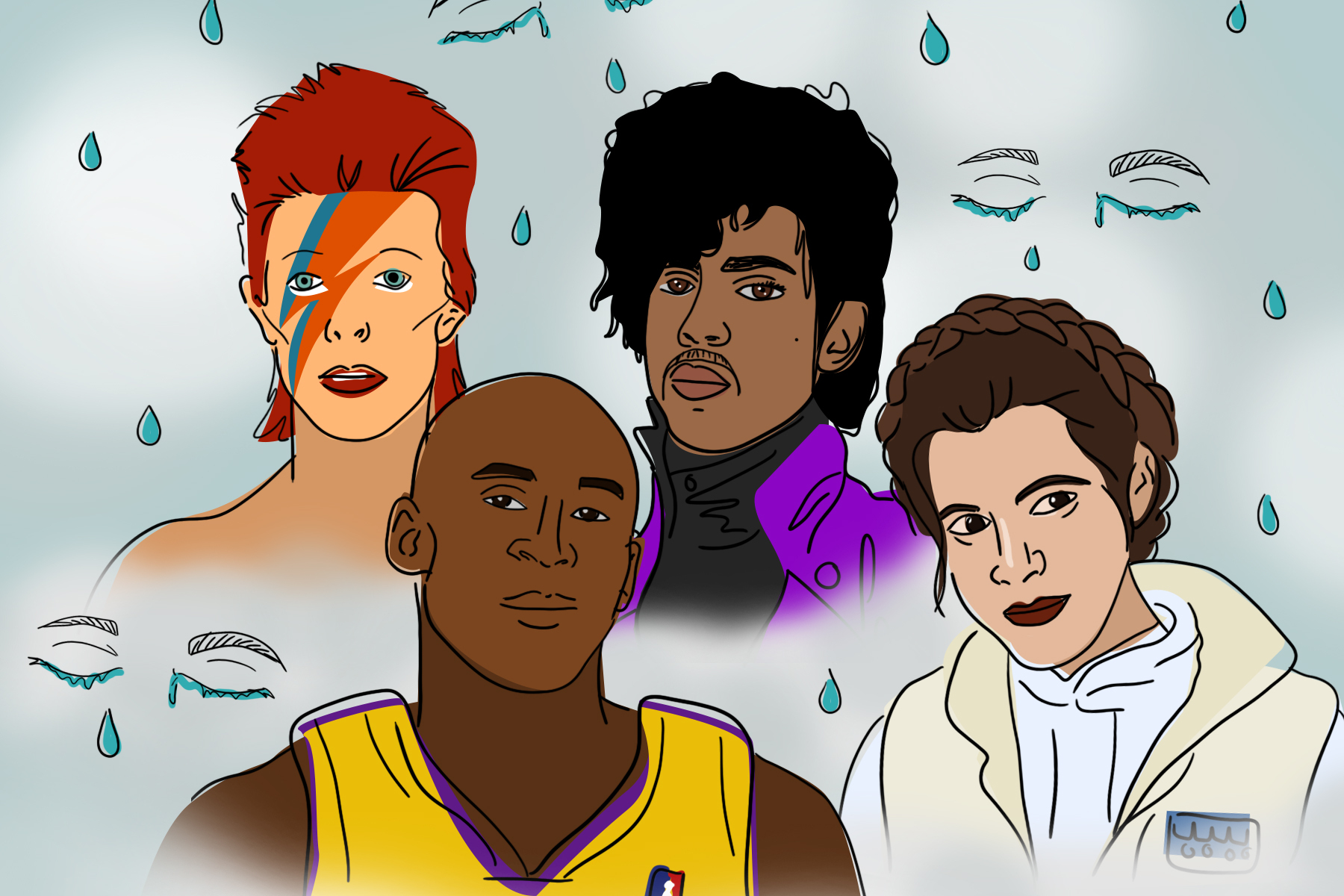The last few years here on Earth have certainly been troubling, to say the least. An intense political climate, a historic pandemic, destructive natural disasters and a long list of deaths, including some of people’s favorite celebrities, have contributed to the past few years being particularly exhausting to get through. However, there is always a bit of wisdom that comes from the depths of chaos, grief and all the emotions in between that the world has forced upon us.
Perhaps one of the most devastating occurrences throughout the past few years has been the premature passing of well-beloved people and the grief that has followed. Kobe Bryant, Chadwick Boseman, Mac Miller, Juice Wrld and Pop Smoke have all passed away in the last two years, leaving their fans to pick up the pieces and attempt to make sense of why they had to leave us so soon. The grief that people feel for those they don’t know can be a gauge of how obsessed contemporary culture has become with celebrity lives, or it can be seen as one of the prime examples of humanity’s inherently empathetic nature. Perhaps it is a combination of both. What is the psychology behind the devastation of these losses as if it was our own friends or family members?
Firstly, people have never had this much insight into their idols’ lives. With the ever-growing pervasiveness of social media, people are able to tune in to each other’s daily activities and feelings like never before. Celebrities are one of the driving forces behind the popularity of social media, as it is the primary way they not only market themselves but also connect with their fan bases. The fact that you can go to nearly any celebrity’s Instagram account and see what they’re up to at any given point of the day is simultaneously absurd and a relatively new concept. People around the world witness their achievements and their downfalls, envy the dates they enjoy with their significant others, learn what clubs they’re at and discover what’s next for them, all information that used to be reserved for their closest companions before it became a central aspect of social media. This has allowed people to become more connected than ever before, for better or for worse.
For college-age individuals, nearly nothing hurt as badly as the passing of Kobe Bryant. College students were able to grow up alongside him — from an arrogant, young, superstar athlete to a multiple NBA champion to an Oscar-winning writer and an incredible family man, Bryant’s existence and personal growth has been witnessed by so many people around the world.
To put it simply, they cared about him. People can hide many things, but one thing they cannot store away is their care. When Bryant passed away, every single one of his fans shed a tear, because they knew him. Fans knew his family, knew about his next endeavors, knew about his life after basketball and knew what was to come from the great legend. People knew him so well that it feels weird to even refer to him as “Bryant” — he will always be “Kobe” to so many people. This, and countless other reasons, is why everybody loved him so much and also why it hurt so badly to see him pass away.
Marcus Aurelius, an ancient Roman emperor and one of the most significant philosophers the world has ever known, begged a question in his book “Meditations” that is as relevant as ever today: “Of each particular thing: ask what is in itself? What is its nature?” So, what is the nature of human beings? Surely, you can point to wars, slavery and even the last few years’ events as examples of people being inherently evil and selfish. While this is valid to a certain extent, I believe human’s compassion for one another is an even stronger intrinsic component of our history and our spirits. For as long as people have existed on planet Earth, people have helped one another.
The dynamics of hunter-gatherer societies are literally as old as time and perfectly illustrate people’s drive for togetherness. Even when humanity had nothing, humans made sure that everyone was fed because no one wanted to see another person starve. A more recent example takes place today, during the pandemic: Many people oppose wearing masks, but there are so many more people that, despite their own lack of infection, have worn a mask every single day to help stop the spread of the coronavirus. Humans generally want to help each other; they want to prevent each other from feeling grief. That is what I think about when the topic of humanity is brought up — not people’s darkest moments, but the love that people can’t help but offer to their neighbors, their friends and their family.
While social media has its own damaging aspects, it also possesses an undeniable light as a sure place where people can gather to express their grief around common tragedies like celebrity deaths. Social media has allowed people to fall in love with their favorite artists, athletes, actors, etc., and has virtually allowed for people to get to know their idols as if they were one of their friends, which, to put it simply, is awesome. Don’t let the few groups obsessed with every waking moment of pop culture cloud your view of how amazing it is that you get to see these people build their families and lives one step at a time — let it inspire you.
Human compassion can be found on every corner if you take a look; it’s just one reason why people feel such pain when their heroes pass away. People feel sad for the families of Bryant and other celebrities who have passed because of the mere thought that they have families that are now also forced to go through a grief similar, albeit much greater, than their own. The way the world reacts to celebrity deaths is in itself a case study of the bright side of social media and the perseverance of the human spirit. After all, humanity could use some light after the last few years. To answer the question posed earlier, people feel because people care.

















